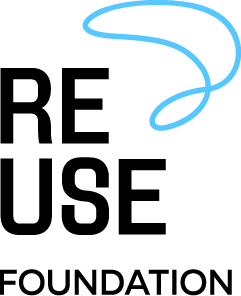Featured
Reuse is Declining and Exacerbating the Plastics Crisis |
|
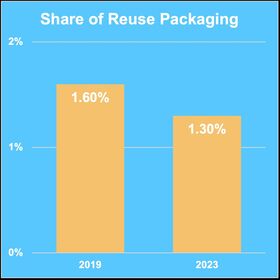
|
Reuse is widely recognised as the best way to reduce reliance on single-use plastic packaging. Here’s what some leading organisations say:
The best data we have on reuse levels is from the companies that signed up to the Global Commitment, an initiative that “unites businesses, governments, NGOs, and investors behind a common vision of a circular economy in which we eliminate the plastic we don't need; innovate towards new materials and business models; and circulate all the plastic we still use, to keep it in the economy and out of the environment”. It shows that for brand and retail signatories, reuse as a share of packaging fell from 1.6% in 2019 to 1.3% in 2023. Nearly 99% of the packaging these companies use is disposable plastic and it’s rising. Arguably, these companies are the most motivated to address the plastic crisis, and the overall picture is worse. Instead of working towards genuinely circular solutions like reuse, signatories are focusing on making their plastic packaging ‘recyclable’. But recycling as a solution is broken and recyclability a farce. As everyone in this field well knows, just 9% of plastic is recycled globally and on current trends that’ll still only 17% by 2060 (OECD baseline scenario). And by far the majority of plastic collected for recycling goes to landfill, gets burnt or escapes to the environment. Plastic recycling is a cover rather than a solution. And while companies work to make plastic packaging ‘recyclable’ as the Global Commitment encourages, they continue to increase the amount of plastic packaging used. Since 2018, overall signatory plastic use is up 6.5%, and since the Global Commitment refrains from asking companies to commit to overall plastic use targets, there’s no cap in sight. If we are serious about reducing our reliance on plastic, we need to move to reuse.[Image Credit: © REUSE Foundation] |
Highlights
Survey Shows Strong UK Support For Reusable Packaging |
|
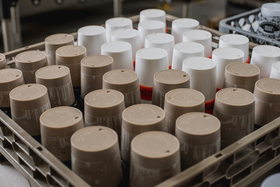
|
A recent survey of 2,000 UK adults, commissioned by environmental charity City to Sea, revealed strong support for reusable packaging as a solution to single-use plastic waste. 75% of respondents believe reusable packaging should replace single-use plastic and 77% want retailers to offer long-term reusable, refillable and returnable packaging. 75% emphasize the need for businesses and the government to support a circular economy to combat climate change. City to Sea CEO Jane Martin highlighted the urgency for retailers to commit to sustainable packaging systems. [Image Credit: © Globelet Reusable on Unsplash]
|
US Public Supports Reducing Single-Use Plastics |
|
.png?width=280)
|
A recent national poll conducted for Oceana found strong public support across political lines for reducing single-use plastics in the US. It revealed 81% of respondents support reducing plastic production, while 88% are concerned about microplastics in food and water. Despite this, the new administration plans to reverse Biden-era policies that promoted alternatives like paper straws in favor of plastics. Oceana and experts argue that reversing this direction undermines efforts to combat plastic pollution, which harms oceans, wildlife and local economies. [Image Credit: © Brian Yurasits on Unsplash]
|
Unilever Scales Refill Models To Reduce Plastic Waste |
|
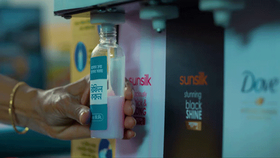
|
Unilever says it’s committed to making all its plastic packaging reusable, recyclable or compostable by 2030 for rigid plastics and by 2035 for flexibles. Since 2018, the company has conducted over 50 refill and reuse pilot projects globally, including in Indonesia, Bangladesh and Sri Lanka. It’s also advocating for supportive regulations and industry collaboration to scale up reuse solutions. [Image Credit: © Unilever]
|
India Mandates Plastic Packaging Traceability, Compliance |
|
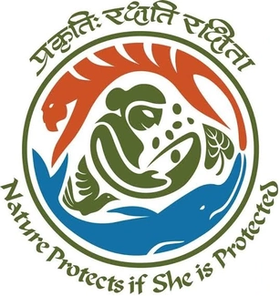
|
India’s Ministry of Environment updated its Plastic Waste Management Rules, requiring producers, importers and brand owners to label plastic packaging with a barcode, QR code or unique number, starting July 2025. These labels must contain information such as the PIBO’s name and a registration number from the Central Pollution Control Board. This initiative aims to improve traceability and accountability in the plastic lifecycle, supporting Extended Producer Responsibility. Non-compliance will incur fines and potential jail sentences. [Image Credit: © Ministry of Environment Forest and Climate Change] |
Henkel’s DESIGNathon Highlights Innovative Sustainable Packaging |
|
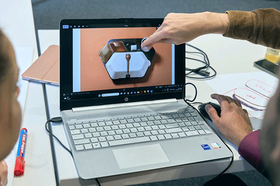
|
Henkel’s DESIGNathon event, held in January at its Inspiration Center in Düsseldorf, aimed to foster sustainable packaging innovations by challenging students to develop real-world solutions promoting reuse and aligning with European Union’s Packaging and Packaging Waste Regulations. The event featured 20 students and focused on ideas that could be implemented within five years. Winning designs included a recyclable blister pack for medical pills made of recyclable PEF material, reusable in-flight meal containers and biodegradable packaging from banana waste to reduce reliance on plastics. [Image Credit: © Henkel AG & Co. KGaA]
|
Berry Global Launches Sustainable Refillable Beauty Packaging Solutions |
|

|
Berry Global is launching three smaller sizes (15ml, 20ml and 25ml) within its Exclusive Stick and Refill range for beauty and personal care products. Made from post-consumer recycled plastic and mono-material polypropylene, they offer easier recyclability and promote material reduction. The refill sticks are lighter, saving around 11.5g compared to earlier sticks, and can be made with up to 100% PCR PP. [Image Credit: © Berry Global Inc.]
|
Ecover Promotes Refillable Options |
|
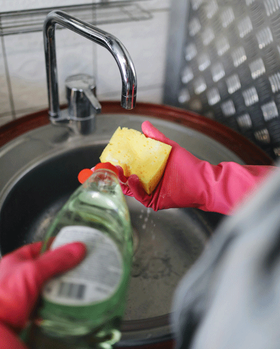
|
In response to the environmental impact of single-use plastic bottles, UK consumers are encouraged to switch to refillable washing-up liquid products. Millions of plastic bottles are used annually for household cleaning items, with a significant portion not being recycled. In 2016, less than half of plastic bottles were collected for recycling, and only 7% were recycled, according to Ecover, which is leading the charge by offering refill stations across the UK and committing to eliminating virgin plastic from its packaging. Other brands like Fairy are also promoting refillable options.[Image Credit: © Polina Tankilevitch on Pexels] |
Microplastics Discovered In Human Brains |
|
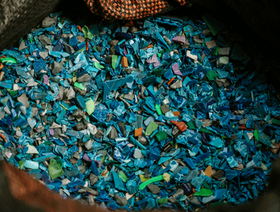
|
Researchers from the University of New Mexico discovered alarming levels of microplastics in human brains, with concentrations higher than in other organs. Over the past eight years, plastic accumulation in the brain has increased by 50%, a discovery that raises significant concerns, especially as microplastics were found to be smaller than previously believed, enabling them to potentially cross the blood-brain barrier. The study also links higher plastic concentrations to dementia, though the relationship remains unclear.[Image Credit: © Stijn Dijkstra on Pexels]
|
Consumers Willing But Struggle To Engage With Refill Stations |
|
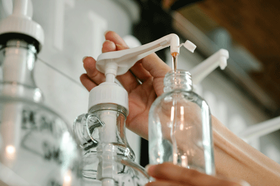
|
Research conducted by Calvin Lakhan from York University, Toronto, highlights a significant gap between consumers’ openness to using refillable and reusable packaging and their likelihood of actively engaging with refill stations. The study surveyed 341 participants from Canada and the United States in 2024 across 22 product categories, including food, beverages, personal care and cleaning items. Although many consumers expressed interest in sustainable packaging, factors such as convenience, contamination fears and the availability of refill stations hindered active participation. [Image Credit: © Sarah Chai on Pexels]
|
Neat. Introduces Refillable Foaming Body Wash |
|

|
Certified B Corp. neat. is innovating in the personal care industry with the launch of its refillable Foaming Body Wash, a sustainable solution aimed at reducing plastic waste in the UK. Available in three fragrances, the product features a concentrated formula that reduces transport emissions and storage space. Each 50ml concentrate creates 500ml of body wash, offering up to 55 washes per refill. The product uses plastic-free packaging, vegan ingredients and dermatologically tested formulas. [Image Credit: © Neat Home Ltd.]
|
UNDP, Coca-Cola Foundation Collaborate On Plastic Waste |
|
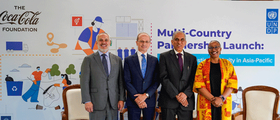
|
The United Nations Development Programme and The Coca-Cola Foundation launched a multi-country initiative to tackle plastic waste in Asia. It’s supported by a $15 million grant from TCCF and will run in nine countries: Bangladesh, Bhutan, Cambodia, India, Maldives, Nepal, Philippines, Sri Lanka and Vietnam. The program aims to improve plastic waste management, reduce plastic leakage, and promote recycling, and will focus on developing innovative waste collection and recycling models, encouraging circular economy principles and supporting policy changes.[Image Credit: © United Nations Development Programme]
|
Political Shifts Will Influence Plastics Sustainability Future |
|
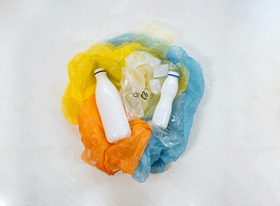
|
The plastics industry faces significant shifts in 2024 from political changes and the push for sustainability. Failure to negotiate a deal at the INC-5 summit highlights the challenges in creating a global plastics treaty. The return of Donald Trump as US President could influence policies that affect plastic manufacturing, with potential rollbacks of environmental protections. His 'America First' economic strategy involving tariffs could also affect the global plastics market.[Image Credit: © Mikhail Nilov on Pexels]
|
Unilever’s Tinsukia Factory Uses AI For Sustainable Transformation |
|
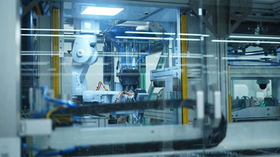
|
Unilever's Beauty & Wellbeing factory in Tinsukia, India, was recognized as a World Economic Forum Global Lighthouse facility for its successful use of AI and Fourth Industrial Revolution technologies to drive sustainability and efficiency. It employs digital twin technology to accelerate sustainable packaging trials, achieving a 21% reduction in virgin plastic usage and scaling packaging trials from two to 30 per year. [Image Credit: © Unilever]
|
Advancing Plastic Waste Reduction: Insights from Engagement Efforts |
|
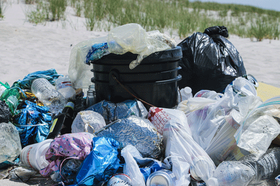
|
A plastics and packaging engagement project from Triodos Investment Management targets 12 consumer staples companies, aligned with the EU's Packaging and Packaging Waste Regulation. It concludes that companies like Danone, Henkel and Procter & Gamble have made progress in reducing plastic use, but face challenges such as material scarcity. Danone excels in transparency and recycled content, Henkel focuses on packaging redesign and P&G works on improving recycling infrastructure. The PPWR plays a critical role by setting enforceable standards and driving systemic change. Additionally, deposit return systems and reverse vending machines are essential tools in advancing circular economy principles and reducing plastic waste. However, achieving ambitious 2040 goals will require greater collaboration and innovation across the industry. [Image Credit: © Brian Yurasits on Unsplash]
|
Innovation For Waste Management: 2nd Life Pakistan 2.0 |
|
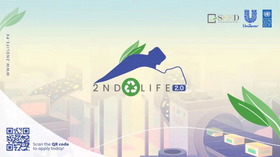
|
United Nations Development Programme partnered with Unilever Pakistan and Seed Ventures for 2nd Life Pakistan 2.0, an initiative aimed at driving innovation in waste management across Pakistan. Building on the success of its first edition, the program now addresses a wider range of waste categories, including food waste, e-waste, textiles and paper. 2nd Life Pakistan 2.0 fosters collaboration among innovators, entrepreneurs and experts to develop scalable, sustainable solutions for repurposing waste into valuable resources. A centralised hub, 2ndlife.pk, provides access to resources, mentorship and networking opportunities for participants. [Image Credit: © Unilever]
|
CAA Expands Leadership To Advance US EPR Laws |
|
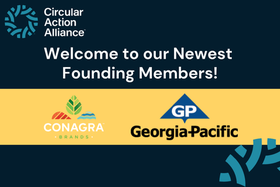
|
Producer responsibility organization The Circular Action Alliance, welcomed Conagra Brands and Georgia-Pacific as new founding members, joining Amazon, Coca-Cola and Nestlé in supporting efforts to implement extended producer responsibility laws for paper and packaging in the US. [Image Credit: © Circular Action Alliance] |
Advancing Refillable Packaging Faces Obstacles |
|
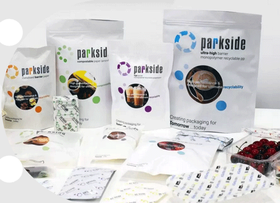
|
In an article featuring Parkside packaging, the author talks about refillable packaging presenting a promising but challenging solution to reducing plastic waste. Despite clear environmental benefits, challenges such as design, cost and consumer behavior hinder widespread adoption. Governments and businesses must collaborate to create infrastructure that supports refillable systems, especially as regulations like the EU’s Packaging and Packaging Waste Regulation push for more reusable packaging. [Image Credit: © Parkside Flexibles (Europe) Limited]
|
